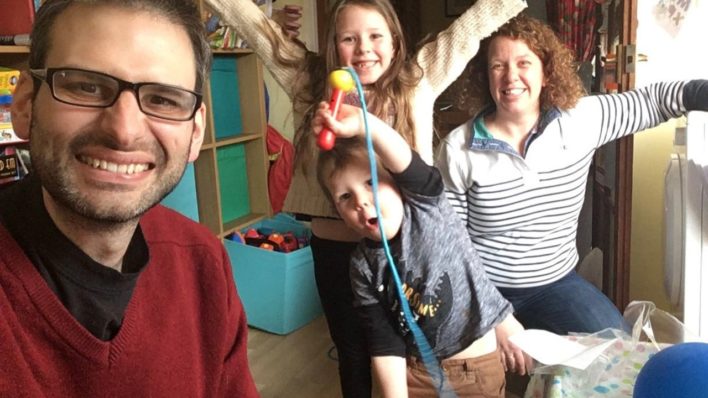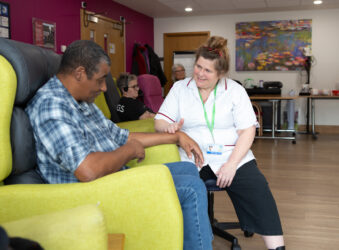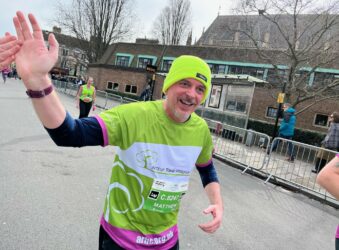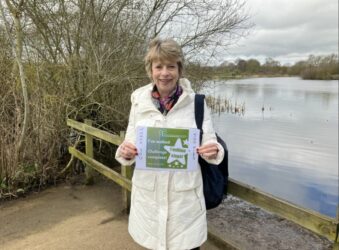Xanthe’s story
Share this story

Xanthe’s husband Sam was diagnosed with bowel cancer very suddenly in February 2017. Despite chemotherapy, things went rapidly downhill and, by July 2018, the couple had decided that Sam should spend his final days at home.
The family received care and support from the Hospice at Home team during the last 3 weeks of Sam’s life.
Xanthe has chosen to tell his story as part of our Help Us Be There campaign, in the hope that more nights of Hospice at Home care can be funded for those that need it such a crucial time.
Sam wore a different hat to each of his appointments throughout his treatment. He had an invincible sense of humour, as Xanthe explains:
“Sam was an amazingly vivacious person. He was a bundle of energy. You always knew when Sam arrived somewhere. He was very loud and would be greeting everybody. He had an enormous number of friends and cared for them so well, remembering details about each person. He was well known for his sense of humour and was always slightly pushing the boundaries of what was acceptable and making jokes. He was really intelligent. He loved to question everything. He read lots of books but would also enjoy chatting about stuff going on in the news, unpacking what was happening. And he was just so loving. He was a great dad.”
Despite their best efforts, the impact of Sam’s illness on their family was huge:
“You really hope you’re never going to have to go through something like this. We all know we are going to die, and our loved ones are going to die, but we found out that Sam had Stage 4 bowel cancer when he was 35 and he died when he was 36. It wasn’t the future we had hoped for or imagined as a family at all.
It was a huge rollercoaster. From the diagnosis we knew that there was only one outcome and the question was just how long we had. In some ways that made life a little bit easier. We knew it was just a question of making the most of the time that we did have. But even so, every time we went for test results we were thinking ‘Is this going to be it? Is this going to be the end of the treatment options?’ Particularly those last few months when we knew he was going downhill very rapidly, when we knew that the end was coming. We had hoped we would get through to another Christmas. He really wanted to have as much time as he could with the children, to see our youngest start school. It was hugely hard.”
The decision as to where Sam should send his final precious weeks and days was an easy one for the family:
“Because we have two small children, in the end, we felt really strongly that home was the right place for Sam to die.
We hadn’t decided this right from the beginning. We didn’t know what it was going to look like towards the end of Sam’s life, we didn’t know how we were going to feel at the time. But over the course of Sam’s last 6-8 months, he ended up having quite a lot of hospital stays and increasingly we realised that it was putting a real strain on our family. It put a real strain on me: trying to be in two places at once; trying to look after him and spend as much time as I could with him, but also be with the children; having to then bring the children into the more formal atmosphere that we found in hospital during restricted visiting hours (which are not always at the best time of day for kids) and wanting then to always to be on their best behaviour and not disturb other patients. All of that made it so clear that if we could all be under the same roof, where the children could wander in and out as they wanted, and have time with Sam when he and they were on good form, then that would be the right decision for us, however hard the challenges would be. So, we said we wanted to give Hospice at Home a try.
We were very relaxed about the options. Being involved with Hospice at Home, we knew we had the option of transferring him to the hospice if it was necessary. That was always the backstop we had, which was amazing. But I think for us it just felt like the right decision for our family at that time, for Sam to be at home.”
It also proved important for their two children:
“It was the summer holidays, so the kids were able to come and go and it was just very natural with them. It was interesting when other children visited. They found walking into the room where Sam was sleeping quite daunting because the bed was in there and there was various medical equipment, whereas our kids just ran in and out.
He was still daddy even in the midst of everything that was going on for us. That was the enormous benefit of Hospice at Home: being able to maintain as much as possible a normal family environment, in the midst of a really trying and difficult time. We still did bedtime together every night, he read stories to them, and was just their dad. I think the Hospice at Home team really helped make the end weeks what we’d hoped they would be. To have him at home, to have all of us home as he was in his last days and weeks was just absolutely amazing and I wouldn’t have traded it for anything else.”
Despite knowing it was right choice for her family, Xanthe needed support:
“The thought of caring for Sam at home was hugely daunting because I’ve got no medical training and had no idea what I was doing. I ended up doing quite a lot of nursing of him, keeping on top of his medication, as well as just the practical running of life, and we were trying to keep life as normal as possible for the children while Sam was dying at home. So, it was a really scary thought.
If we hadn’t had the support of the Hospice at Home, Sam couldn’t have stayed at home at the end, there was just no way. I think, for all that the community services are amazing, I would have burnt out within three or four days. There was such a steep learning curve to learn how to care for him, how to give him the right pain medication and obviously his condition was constantly changing as well. He was having to continually be reassessed.
Sam was only really happy with me (as somebody who knew everything that was going on with his condition) or a healthcare professional. If it hadn’t been for Hospice at Home, we would have been looking at a hospice or a hospital or something else which would not have worked for us as well as a family.”
The support she received from Arthur Rank’s Hospice at Home team was two-fold:
“There was the aspect that people know a bit more about when it comes to Hospice at Home -the overnight support. It wasn’t every night by a long stretch, but on the nights when I needed a break, they would come in. I was sleeping on the floor in the same room as Sam because he needed medication in the night, or he would need support. When the Hospice at Home team came, they would sit downstairs (where Sam was sleeping) in another room and they would check on him regularly. They would stay awake the whole night, look after any pain medications and anything else he needed, and just allow me to have a night off and sleep in my own bed. But I would still be at home, still be under the same roof. I knew that they’d come wake me up if needed, which was amazing.
Then there is the other aspect, which for me was sort of more important in terms of feeling like I could manage the care at home. There was a lovely lady who came and talked us through the care and everything that was happening. Officially the GP was the care coordinator, the lady from the Hospice was brilliant at talking through different decisions and different options; having more experience of end of life care.
I never felt like I was asking a stupid question with her, I never felt like anything was off limits to talk about. It was wonderful to have her support. I never felt left alone to deal with all of this. I just felt that she had my back and [it was] not just her, but the whole of the team. You just knew that if you rang the number with any question or needing any support or if I changed my mind and I suddenly did need somebody to come that night if it was at all possible, that they would do everything they could to support us. They were great at advising us on how to get the District Nurses involved, how to get the GP involved, how to coordinate all the care because we had no experience of any of this. Trying to work out how to manage all the different people was challenging and the team were a great help.
They helped us think around problems that didn’t have obvious answers. They found ways for me to be trained on how to do the injections and all the things that Sam needed, so we could offer him the best care possible in the right environment for us. The first week particularly, when Sam was at home, we were able to have lots of friends and family through the house to say goodbye. It just felt very normal in a lot of ways and that was really lovely and the second and third week, when he was going downhill much more, it was much more just immediate family and special time together.
Both of those aspects made a real difference, being able to ring at any point of day and say ‘Help, I don’t know what I’m doing’ but also having that team overnight.”
The Hospice at Home team would also check in on her each day:
“The emotional support was really key. Every time they rang, they would ask ‘Do you need somebody to come and stay the night?’ They would ask very simple questions like ‘How are you?’, ‘How are you coping today?’, ‘Have you had any sleep?’ They understood that it was really important that I was looking after myself as well.
Sometimes, when I felt like I didn’t want to leave Sam overnight, but it had maybe been two or three nights since I’d had any help, they’d say ‘Do you think we should maybe send somebody tonight? It sounds like you could probably do with a break. You know we’ll wake you up if we need to’. Particularly towards the end when I was getting nervous about leaving him, they were really brilliant about looking after me as much as they could. And helping me to look after myself, so I could look after Sam better, and the children.”
She feels all of them were cared for:
“I think what was really helpful about the Hospice at Home team was how they cared for us as a whole family. It wasn’t just the medical stuff for Sam – although that was massively important in giving me the confidence in looking after him at home – but it was also that they really cared about us as a family.
They cared about how I was doing. They cared about how the children were doing too. It was a really disruptive time for them – it was the summer holidays. We had grandparents staying to help, lots of people visiting and they were here there and everywhere. They were amazing about providing some resources for the children – some books and things just to help talk through everything that was happening. That all came through the Hospice at Home team.”
The simple phone calls to check I was okay, check if I needed anything, meant I knew there was a regular check-in with me as well as how we were caring for Sam. One day we had a visit from one of the Hospice’s complementary therapy team. She came to massage Sam’s legs and help with the swelling and fluid retention, but she was very insistent I had a massage too – which was lovely.
The fact that the team, as individuals, but also together, made us feel so secure and loved, in what was a really horrible time, that is incredibly special. They are an amazing bunch of people. The fact that they deal with this day in day out, I don’t know how they do that, because it must be so hard for them at times as well. But, personally, I am really grateful that they made those decisions to specialise in this area because it means that for people like us, we had all the support we needed”
Having support from the Hospice at Home team at such a critical time meant that Xanthe also got to spend precious time with Sam:
“I think being able to not just be Sam’s carer but Sam’s wife at the end was really important – having time together – because I didn’t have to worry about the medical decisions. We weren’t waiting on doctors or nurses to arrive. We had a plan and we knew what was happening. I knew we had people we could call if there was a problem.
That meant that we could actually really enjoy our time together as well. Sam was a big reader, so I read to him a lot in those last few weeks and we could chat about stuff and he wanted to record little videos for the kids. All those kinds of things. I think that was really key. Having special time together with Sam in those last few weeks as a wife, but also as a Mum – and for him being able to be a Dad – was really important. Hospice at Home allowed us to be family together, the four of us, at the end.”
The family were able to find some peace at a time of great heartbreak thanks to the wrap-around support provided by the Hospice at Home team:
“Sam obviously didn’t want to die. He didn’t want to leave us. But knowing that it was the end that was as close to what he could have wanted as possible (and was feasible in the circumstances), I think that gave him a lot of peace at the end. He wasn’t worried about me not being there. He wasn’t worried about being surrounded by hospital staff and the lack of privacy that you get in that kind of environment. With Hospice at Home we were able to allow Sam’s wishes to die at home, to become a reality which otherwise I don’t think would have happened.
Caring for him in those final days, knowing that he was able to die at home surrounded by so many people who loved him and wanted to be around him, meant that I never worried about when the moment was going to be. I never worried that it was going to be a time when I wasn’t there, because he was with me at home.
We did everything we could to make his end how he would have wanted it be. It was as comfortable as possible and that means that I don’t look back with any regrets on those final weeks. For me that is hugely important and has really helped me in my grieving process, just to know we did everything we could to make his end happy and surrounded with love and family. That does not mean it is not hard, but I think it did make a huge difference.
I think it gave it him huge peace and that gave me huge peace and that gave the children peace as well, that it was all the best it could have been. It was lovely for all of us as a family: to go with his wishes as much as we could. That was amazing.”
Xanthe Barker chose to tell her story as part of Arthur Rank Hospice’s ‘Help Us Be There’ campaign, in the hope that more nights of Hospice at Home care can be funded for those who need it at such a crucial timeXanthe Barker chose to tell her story as part of Arthur Rank Hospice’s ‘Help Us Be There’ campaign, in the hope that more nights of Hospice at Home care can be funded for those who need it at such a crucial time
Arthur Rank Hospice Charity is aiming to raise £100,000 to fund 200 additional nights of urgently needed Hospice at Home care, over the next year.
You can watch the video, produced in partnership with Xanthe, and Mill River TV, to learn more about how you can Help Us Be There on our You Tube channel
View other stories
-

Living Well with Complementary Therapy
Complimentary Therapist, Laura Hawksley shares her Living Well tips
-

30-year-old, Marries herself at the Hospice
Leanne explains how she ‘felt complete and whole, more accepting and proud of myself’
-

Hospice supporter runs Half Marathon in memory of his best friend
Matt runs the Cambridge Half Marathon on which would have been his best friends 48th birthday
-

Hospice supporters walk across the globe for patient’s care
Step a Million Walkers travel to Canada and New Zealand




